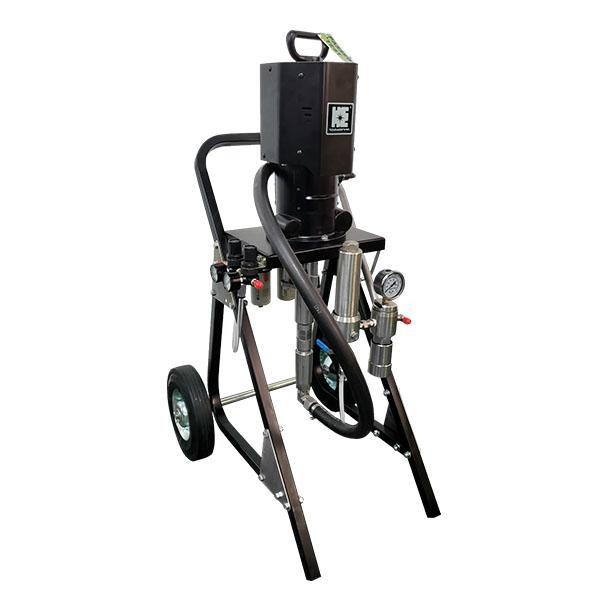Air Mixers: The Unsung Heroes of Mixing and Blending
In the world of industrial processes, mixing and blending various materials are essential steps in creating countless products we use in our daily lives. One critical tool that plays a significant role in these processes is the air mixer. Although often overlooked, air mixers are unsung heroes that ensure consistent mixing and blending of liquids and materials in various industries. In this article, we'll explore what air mixers are, how they work, and their importance in industrial applications.
What is an Air Mixer?
An air mixer, also known as an air-driven mixer or pneumatic mixer, is a mechanical device that uses compressed air to mix or blend liquids, powders, and other materials. These mixers are commonly used in industries such as manufacturing, pharmaceuticals, chemicals, and food processing. They come in various designs and configurations to suit specific applications.
How Do Air Mixers Work?
Air mixers work on a straightforward principle: they use compressed air to agitate, stir, or blend materials in a container. Here's a simplified breakdown of how they work:
Compressed Air Supply: An air mixer is connected to a source of compressed air through a hose or pipe. The pressure and flow rate of the compressed air can be adjusted to control the mixing intensity.
Impeller or Blade: Inside the container, there is an impeller or blade attached to the air mixer. When the compressed air flows through the mixer, it causes the impeller to rotate.
Mixing Action: As the impeller rotates, it creates a flow pattern within the container, forcing the materials to move and mix. The degree of mixing can be adjusted by changing the speed and direction of the impeller.
Uniform Mixing: The continuous movement of the materials ensures that they are thoroughly mixed, resulting in a uniform blend or mixture.
Types of Air Mixers
Air mixers come in several types, each designed for specific applications:
Drum Mixers: These mixers are designed to mix liquids or materials in drums or barrels. They are commonly used in industries like chemicals and paint manufacturing.
Tank Mixers: Tank mixers are used for larger containers or tanks and are ideal for applications in the food, pharmaceutical, and beverage industries.
High-Shear Mixers: High-shear mixers are designed for tasks that require intense mixing and blending, such as emulsifying and dispersing.
Propeller Mixers: Propeller mixers have a simple design with rotating blades and are suitable for general mixing tasks in various industries.
Agitators: Agitators are similar to mixers but are often used for applications that require gentle stirring or continuous agitation, such as keeping particles suspended in a liquid.
The Importance of Air Mixers in Industry
Air mixers play a crucial role in a wide range of industrial applications due to several key advantages:
Consistency: Air mixers ensure consistent mixing, resulting in uniform product quality. This is particularly important in industries like pharmaceuticals and food processing, where precise formulations are critical.
Efficiency: Air mixers are highly efficient and can achieve thorough mixing in a relatively short amount of time, increasing productivity in manufacturing processes.
Customization: Air mixers can be tailored to meet specific mixing requirements, allowing for versatility in various applications.
Cost-Effective: The use of compressed air as the driving force is cost-effective and energy-efficient compared to other mixing methods.
Safety: Air mixers are often used in environments where the presence of electricity could be hazardous. Their pneumatic operation eliminates the risk of electrical sparks in volatile or explosive atmospheres.
Applications of Air Mixers
Air mixers find applications in a wide range of industries and processes:
Chemical Manufacturing: Air mixers are used to blend chemicals, emulsify liquids, and ensure consistent mixing in the production of various chemical products.
Food and Beverage: In the food industry, air mixers are employed to mix ingredients for products like sauces, dressings, and beverages.
Pharmaceuticals: Air mixers are essential for blending pharmaceutical ingredients, ensuring product uniformity, and meeting strict quality standards.
Paints and Coatings: Air mixers play a vital role in mixing pigments, solvents, and other components to create paints, coatings, and inks.
Water Treatment: Air mixers are used in water treatment processes to mix chemicals for disinfection, coagulation, and flocculation.
Cosmetics: In cosmetic manufacturing, air mixers help blend ingredients for creams, lotions, and other personal care products.
Safety Considerations
While air mixers are valuable tools in industrial processes, safety must always be a priority:
Proper Training: Operators should be trained in the safe operation of air mixers to prevent accidents and injuries.
Maintenance: Regular maintenance and inspection of air mixers are essential to ensure they are in good working condition.
Compressed Air Safety: Ensure that the compressed air supply is maintained at safe pressure levels and is free from contaminants.
Pneumatic System Safety: The entire pneumatic system, including hoses and connections, should be checked for leaks or damage regularly.
For More Info:-

Comments
Post a Comment